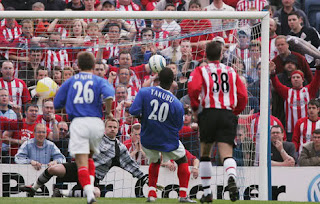 So the international career of David Robert Joseph Beckham OBE has ended for the second time, again for reasons beyond his control. A ruptured Achilles tendon has ensured that he won't be going to the World Cup, and even the most one-sided Beckham apologists couldn't possibly think he'd make the European Championships in 2012.
So the international career of David Robert Joseph Beckham OBE has ended for the second time, again for reasons beyond his control. A ruptured Achilles tendon has ensured that he won't be going to the World Cup, and even the most one-sided Beckham apologists couldn't possibly think he'd make the European Championships in 2012.He could well go down in history as being the last player, at least from western Europe, who'll be primarily remembered as an international footballer. The images of him that will endure won't feature him clutching the European Cup he contributed so much towards winning, or even the 50-yard lob against Wimbledon in 1996 that shot him to national fame.
No, Beckham's iconic moments are a petulant kick at an Argentinian, a shaven-headed one-man-show against Greece, and tears (not for the first or last time) in Gelsenkirchen. The reasons for this are both down to the man himself and the particular circumstances of his club career.
Firstly, gaining the England captaincy in 2000 profoundly changed Beckham and how he saw the importance of playing for his country. Only months before he'd been giving the finger to his own fans after a truly pathetic defeat to Portugal in Euro 2000. But as captain, he seemed to relish the challenge of dragging the national team up from the sorry mess Kevin Keegan had left it in.
The 2001-02 season confirmed him as an England player first and foremost. He made "metatarsal" enter the national lexicon and, after an injury saga played out in the world's media, catharsis against Argentina made up for a quarter-final defeat.
With nearly seven years hindsight, his departure from Manchester United in 2003 seems more and more closely tied to his international career. Alex Ferguson saw the England captaincy as another part of Beckham's "celebrity lifestyle", and only a year later the more obedient Paul Scholes would give up playing for his country. Becoming a Galactico in Madrid was never about the football, just somewhere to keep fit between England games.
But fit he never really was, neither in 2004 nor 2006, and after he gave up the captaincy at a tearful press conference he was deemed surplus to requirements by the clipboard-carrying buffoons of the new regime. With nothing left to play for in Europe now that his beloved England had rejected him, he signed a contract to chase dollars in the MLS at the start of 2007.
But Steve McClaren came calling again, tail-between-legs, and the boy Beckham was back in favour. England would sink even lower under McClaren than they had with Keegan, and when Fabio Capello took over he made it clear that there'd bee no more caps for Beckham unless he was playing in a proper league.
Effectively tearing up his MLS contract with LA Galaxy, he agreed a loan deal with AC Milan that would see him play from January to May in 2009 and 2010. Always overlooked in the Galaxy story is that Beckham only left for America because he was convinced that he'd never play for his country again. So excited was he by the prospect (and only that, remember) of going to one more World Cup that he abandoned the project he'd claimed to be so committed to when he arrived in Los Angeles in July 2007. He based his entire career from 2003 onwards around representing his country. Footballers just don't do that any more.
This phenomenon also has a lot to do with circumstance. Beckham's peak period as a player, from 1998-2003, was a time before the Champions League became the all-consuming behemoth it is today. Real Madrid's pathetic form in the competition since 2003 meant that he never played a prominent role in the modern, bloated, Anglo-centric Champions League.
The European Cup now showcases the drama of World Cups annually rather than every four years, broadcast live around the globe to hundreds of millions. International football just isn't as important or as entertaining to most people any more. We live in a football world where players can be labelled "world class" without ever performing at the very highest level which, in terms of technical and tactical proficiency, is still the World Cup. The Champions League defines Lionel Messi, Christiano Ronaldo and their peers, their national teams are a side story.
Beckham was the last player whose narrative was played out in the shirt of his country, but now the story is almost certainly over.






.jpg)